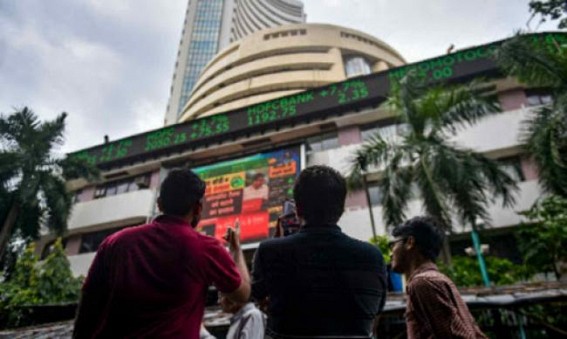TIWN

Mumbai, March 22 (TIWN) After a continuous bear run in the past few days, Indian stock markets witnessed a surge on Friday with the the BSE Sensex closing over 1,600 points higher.
The 30-stock Sensex tasted the psychological mark of 30,000, before ending just below it. The Nifty50 also soared over 400 points to settle over 8,700 points. Although the markets witnessed volatility during the initial trade, buying soon took over and the rally continued through the day. The rally in the domestic indices was in line with Asian and European shares. Further, analysts also said that the investors took to value buying after the recent freefall. The Sensex closed at 29,915.96, higher by 1,627.73 points or 5.75 per cent from its previous close of 28,288.23. It had opened at 28,460.82 and touched an intra-day high of 30,418.20, and a low of 27,932.67 points. The Nifty50, on the National Stock Exchange (NSE), settled at 8,745.45, higher by 482 points or 5.83 per cent from its previous close. Healthy buying was witnessed across sectors led by IT, energy, FMCG and metal stocks. The major gainers on the Sensex were ONGC, which rose by 18.5 per cent, followed by Ultratech Cement (13 per cent up), Hindustan Unilevel (11.75 per cent), Reliance Industries (11.24 per cent) and TCS (9.9). On the other hand, HDFC Bank (1.39 per cent down) and IndusInd Bank (0.88 per cent down) were losers. Off late, stock markets across the world have taken a beating owing to the concerns of the coronavirus pandemic severely impairing the global economy. In order to assess the impact of the crisis on every sector of the economy, the government os to form an economic response taskforce, which would also suggest steps to curb the severe impact and suggest revival plans. Addressing the nation on the coronavirus crisis on Thursday, the Prime Minister announced the creation of a Covid-19 economic response task force, which would assess the requirements of various sectors and also oversee implementation of the proposed measures.
The task force is likely at measures, such as extension of loan tenors for the micro, small and medium enterprises (MSMEs) and relaxing NPA (non-performing assets) norms, while on the taxation part, GST may be waived on hospitality and tourism sectors. In order to infuse liquidity into the system and support investor sentiments, the Reserve Bank of India on Friday announced to undertake additional purchase of government securities worth Rs 30,000 crore through open market operations (OMO).
The apex bank has showed it is ready to take measures required to calm the markets and improve liquidity. RBI Governor Shaktikanta Das announced on Monday that the apex bank would conduct a six-month swaps worth $2 billion to provide liquidity to the foreign exchange market and conduct more long term repo operations (LTROs). The central bank, however, did not go ahead with a much-anticipated emergency rate cut. Das said that rate cut decisions are taken by the Monetary Policy Committee (MPC), however, nothing should be ruled out. Analysts and experts, however, say that an emergency rate cut is the need of the hour and it would instill confidence in the financial markets.
- India’s industrial growth at 3.5 pc in July signals healthy recovery: Economists
- AI to unlock $500 billion opportunity for India’s tech services: Report
- India’s credit rating upgrade to boost investors’ confidence, drive foreign capital inflows
- Centre to update WPI, IIP; announces launch of new Producer Price Index
- S&P Rating's growth projection for India is no surprise: SBI Research



